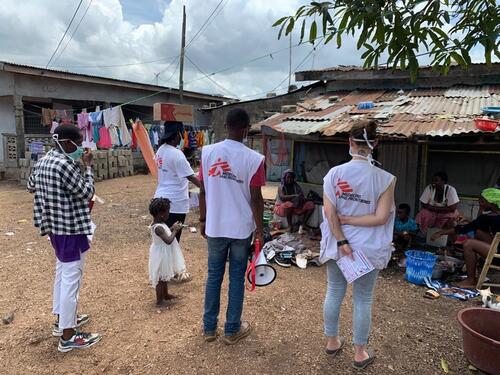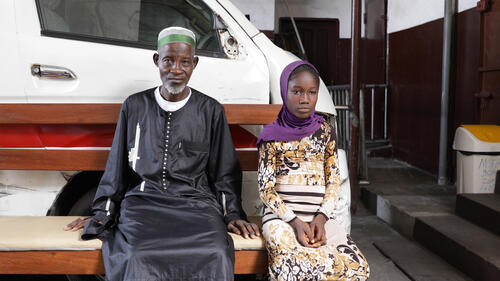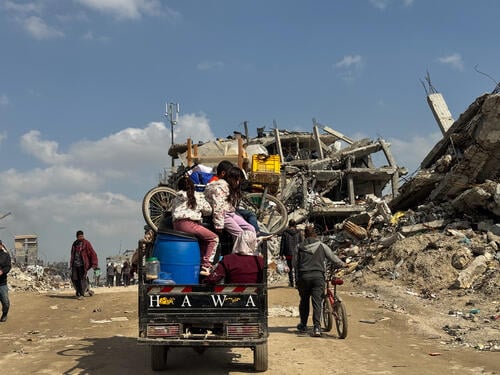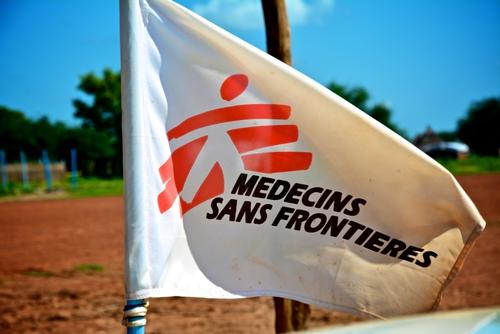Liberia has closed its borders and declared a state of emergency in response to an outbreak of COVID-19, after confirming its first case on 16 March when a resident returning from overseas was diagnosed with the virus.
Still haunted by the West Africa Ebola epidemic during 2014 – 2016, Liberia has been quick to respond to the COVID-19 pandemic, implementing travel restrictions, widespread temperature checks and hand washing stations. Médecins Sans Frontières (MSF) is supporting the work of local authorities, by providing donations and advice to the Ministry of Health and its COVID-19 treatment centre, in Monrovia, the capital city. We are also carrying out an awareness and soap distribution campaign in four of Monrovia’s most vulnerable communities.
Iline Celeen is the MSF Emergency Project Coordinator in Liberia, working on the COVID-19 response in the country and outlines what we’re doing in this interview.
What is the current situation in Liberia with regard to the COVID -19 outbreak?
Liberia has sealed its borders and has imposed a nation-wide curfew. Government offices are closed, and most people have been asked to work from home. Those who are suspected of having been exposed to COVID-19 have been moved to isolation centres in, and around, the capital. People who have been confirmed with COVID-19 have been moved to a military hospital in Monrovia, which is being run by the Ministry of Health (MoH) as the COVID-19 referral centre.
Many hospitals have closed, and in those that are still open, services have been greatly reduced. This has resulted in the interruption of the overall healthcare system in Liberia and we fear this could potentially result in an increase of non-COVID-19 related health issues like malnutrition and malaria cases, especially in children.
Many people are still traumatised from the Ebola outbreak. We are observing that many people are reacting to COVID-19 much like Ebola, with a fear of being stigmatised, rumours in the community and a general mistrust of the health system, making it difficult to access patients. The names of confirmed cases are also being announced in the media, so people are afraid of being tested.
Many people are still traumatised from the Ebola outbreak. We are observing that many people are reacting to COVID-19 much like Ebola.Iline Celeen, MSF Emergency Project Coordinator in Liberia
What immediate activities has MSF rolled out to help prevent the spread of COVID-19?
In 2015, MSF opened a paediatric programme at Bardnesville Junction hospital in Monrovia. At that time, the objective was to offer non-Ebola care as almost all hospitals were closed. This hospital project continued after the Ebola outbreak ended, and in 2018 we added paediatric surgical care, as there were no other hospitals in the country carrying out surgeries on children.
The surgery programme has been suspended and staff are now working on improving the triage flow and preparing a high-risk isolation area where the objective will be to stabilise COVID-19 patients before they are transferred to the military hospital. Staff at Bardnesville have been provided with hygiene kits and health awareness information, including on proper hand washing techniques, physical distancing and cough hygiene.
MSF is providing the military hospital with technical support and basic medical supplies, including an oxygen machine, masks and other personal protective equipment (PPE).
At the beginning of April, more than 150 MSF staff and volunteers launched a health awareness and soap distribution campaign in four of Monrovia’s most vulnerable communities, including New Kru Town, Westpoint, Logan Town and Claratown, reaching approximately 77,000 households.
What impact has the COVID-19 pandemic had on MSF’s programmes in the country?
MSF’s experience in Liberia is a prime example of how we have been forced to adapt our work in the field in response to challenges posed by the COVID-19 outbreak. In Liberia, we have been unable to fill critical international staff positions, such as paediatric surgeon and paediatric anaesthetist roles, due to travel restrictions caused by the pandemic.
MSF has suspended our paediatric surgery program at Bardnesville Junction hospital and is now referring emergency cases to other hospitals, which lack the specialisation in paediatric surgery. Some of those hospitals are also beginning to close down now too.
Our mental health project in Liberia has also been forced to adapt, by stopping new enrolments and cutting back on appointments to minimise the movement of staff and patients. Staff are now providing remote support over the phone and patients have received a two-month supply of drugs.
Other constraints we are facing is the global shortage of PPE material which are key for effectively protecting health staff managing patients with COVID-19.
Going forward, what COVID-19 activities does MSF have planned to help the people of Liberia?
Due to constraints in general, the plan is to prioritise our ongoing activities, as many people continue to suffer from non-COVID-19 health issues. MSF will continue to support the MoH through training, guidance, light material support and massive health promotion and soap distribution campaigns, such as the one we just conducted in the poorest areas of Monrovia.






